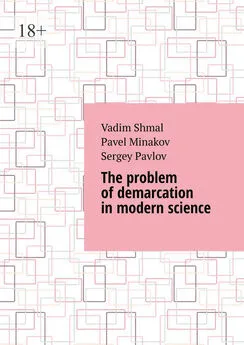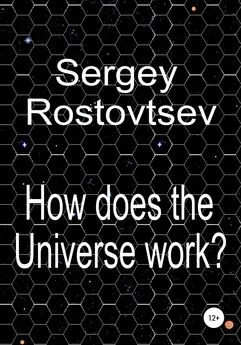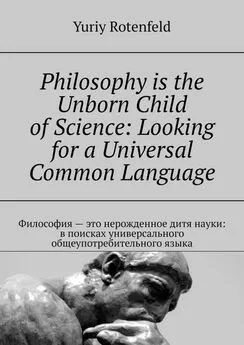Sergey Pavlov - The problem of demarcation in modern science
- Название:The problem of demarcation in modern science
- Автор:
- Жанр:
- Издательство:неизвестно
- Год:неизвестен
- ISBN:9785005532459
- Рейтинг:
- Избранное:Добавить в избранное
-
Отзывы:
-
Ваша оценка:
Sergey Pavlov - The problem of demarcation in modern science краткое содержание
The problem of demarcation in modern science - читать онлайн бесплатно ознакомительный отрывок
Интервал:
Закладка:
The philosopher Karl Popper proposed a synthesis of logical positivism, functionalism and socialism. Popper popularized the use of the term «positivism».
Logical positivism, formulated in the 1920s, argued that the truth of a statement is «whatever is consistent with observable facts.»
The concept of a truth principle in modern logic does not imply this – for example, the statement that «all numbers are rational» is not really a statement about what is true, but only about what can be proved.
Logical positivists also do not exclude so-called non-empirical statements.
The statement that «x» or «y» is more likely to be true in the case of «X» as opposed to the case «Y» requires that «X» and «Y» be consistent statements, which they claim to be means that logical positivists must argue that «truths» of this kind are not really «truths» or «truths» of the world.
However, most subsequent systems of epistemology, such as realism, positivism, and analytical philosophy, tend to assume that logical positivists were right in saying that there are non-empirical statements that are also true.
Practical applications such as medicine and legal practice tend to focus on statements that can be falsified or supported, and thus the assertion that true statements are necessarily true is removed from the problem of determining whether a particular statement is true or false…
However, since modern theories of mind and cognition are still often based on the traditional form of empiricism, the problem of non-empirical statements is still relevant.
The statement that «x» is more likely to be true in the case of «X» than in the case of «Y» is often viewed as an example of a reduction axiom with axioms of the form «x» and «y». truth is perceived as an obvious axiom of the existence of a relationship.
However, it has also been argued that such arguments presuppose the idea that there is no cognitive system – and therefore no belief system – that can speak of something other than itself, a view that has not gained widespread acceptance.
A particularly important form of logical positivism that is commonly associated with the scientific method has come to be known as logical empiricism and is closely related to the knowledge argument for the existence of God.
In the nineteenth century, Russell, Frege and most logical positivists defended the strong version of the thesis of the logical positivists: the «logical positivism», i.e. an adequate and correct theory of knowledge itself is a true science. Since then, this thesis has been questioned by some adherents of logical empiricism.
After Wittgenstein’s theory of concepts Wittgenstein influenced the logic, some of whom believe that what is true for proposals (including the logical positivists) is true for any «concepts», and some of them believe that the truth of one kind of truth is usually and necessarily linked with truths of a different kind.
The new thesis arose as a result of the development of Wittgenstein’s philosophy. Most logical positivists denied the possibility of metaphysics; but there were some who thought that metaphysics was wrong on only one occasion, and that was when it gave meaning to things that didn’t really make sense.
Some logical positivists took this position and argued that metaphysics should only be taught in primary schools, if at all, and that metaphysics should have no place in higher education or professions. Others, however, argued that this position is inconsistent.
Russell called the first position «twice negative logic.»
In the second position, «double positive logic» describes the usual human use of language in which there is no opposition between sentences that imply or make sense of each other.
When Wittgenstein and his followers speak of an «intentional binding relationship,» they mean that the word must refer to something else in order to have meaning.
From this point of view, there is no metaphysics or even the science of metaphysics, because there is no opposite entity in the universe.
Many of the conclusions Wittgenstein is t e, which are known as anti comprehensionist, in fact, they argue that any relation between the world and the human mind, there must be.
In his Remarks on Foundations of Mathematics, Wittgenstein argued that (at least briefly and in extremely restrictive terms) there is no truth, reality or existence as we know them.
In his Treatise on Human Knowledge, and in his treatise on logic and philosophy, Wittgenstein believed that an attempt to explain the world of formal logic was likely to give a false idea of reality. Logical positivists were in principle open to these objections.
Wittgenstein later argued that the rejection of transcendental idealism (and therefore ontology) was a major mistake of logical positivists, because it led them to misunderstand the nature of objects. He called their position «superstitious» because it is based on the false belief that one can distinguish «what is real» from «what is false», which he himself considered dubious.
According to Wittgenstein, it is obvious to logical positivists that nothing real can matter and that everything that is either a phenomenon or an illusion (or something that can be called a phenomenon or an illusion). He called the approach of the logical positivists «superstitious» because it is based on the assumption that they can only explain the world «by the terms on which we are allowed to speak of what is real,» and that they did not realize that reality cannot be treated in this way.
As Wittgenstein argued, and as Fodor and Eilanden argued for his arguments, it is impossible to speak of «the world» using the terms adopted by logical positivists, and it is meaningless to say that it is possible to describe the world with the conditions they use.
Wittgenstein’s arguments show that it is impossible to explain the world in the language of logic (or his paradigm of language, Tractatus Logico – Philosophicus).
One of the results is that Wittgenstein believed that a person cannot even speak about what is real using the language of logic, since logic cannot identify what is real. He also argued that it is impossible to identify «that which is possible» with the terms in which they speak about him (and, in the same way, it is impossible to identify «that which is unreal» with the terms in which they speak about him).
According to Wittgenstein, both «unreal» and «impossible» can be defined based on the terms used to describe them.
It is important to note that all this talk about the language used to describe reality and the language used to identify things that cannot be spoken to are entirely conceptual. It is not at all obvious that language in general, or logic of statements in particular, can be used to describe reality or what is «impossible».
Logical positivists took Wittgenstein ’s arguments about what they were, about the impossibility of describing the world in language, as about the meaninglessness of statements. And in later life, Wittgenstein seems to have adopted the positivist assumption that language does not matter and cannot distinguish the unreal from the real.
However, this «logical positivism» is actually much more concrete than is usually assumed.
In the Tractatus Logico – Philosophicus, Wittgenstein argued that judgment is meaningful only if it can be used to determine, within a given language system, whether something is «real».
Thus, from a linguistic point of view, we could say that the word «non-existence» («nihil») or the phrase «there is no such thing as non-existence» («gaunenlos siegen nicht») are meaningless expressions.
It is important to note that the Tractatus does not state that the only sentence that matters is the true sentence. It is possible to define sentences in languages in which it is impossible to say anything about the meaning of a sentence so that they can be used to define what is real, and Wittgenstein even argued that sentences in such languages make sense.
The term «theory» is used by Wittgenstein in a completely different way. For him, theory is a formal system (in the sense of the «language of theory») in which a number of statements about the real are attributed to objects and properties in the model of the world.
It is not immediately obvious that it is possible to define a «model of the world» in the sense in which Wittgenstein used the term, but he did. The «model of the world» that Wittgenstein defines in this context is not a physical model, but a logical model. (This can be viewed as the same as how some prefer to think of it as a model of a given mathematical theory.)
A theory in theoretical language is a set of statements about the real that can be used to determine the reality of something.
A good example of a theory is Einstein’s special theory of relativity, which, thanks to the use of a mathematical formal language, is perfectly suited to describe what happens to an observer in a special system of relativistic physics.
If the model of the world doesn’t really explain everything about the world, then it may not be a very good model after all.
Indeed, some say that the logical positivist system can actually explain more about the world than any theory it discusses. But if the system of logical positivism is not a very good model of the world, it can still be used to determine whether something is real.
To use Wittgenstein’s terminology, the distinction between the real and the unreal for Wittgenstein is «visual.»
For logical positivists, the world is «non-visual».
Wittgenstein, however, does not regard the world as" non-visual, "and even if it were, it would not be a problem: it is entirely possible to describe the world in visual language. In any case, the world is a visual object, even if the universe it is in is not.
The central theme of Wittgenstein’s later philosophy is his view that language cannot distinguish between the real and the unreal, that the world is an understandable world, and that the meaning of a statement can be determined using this statement.
Some critics have argued that these views do not «challenge» the traditional position that the world is understandable, but that they do challenge the old position that language cannot be used to distinguish the real from the unreal.
Development of ontological relativism
According to Alfred Jules Ayer, metaphysicians claim to have «a knowledge of reality that [transcends] the phenomenal world.» Ayer, a member of the Vienna Circle and a well-known English logical positivist, argued that it was impossible to make any statements about the world outside of direct sensory perception. If an empirical statement such as «The earth revolves around the sun,» Ayer argues, is a statement about the world outside the realm of sense perception, then that too cannot be explained.
The Philosopher John F. Bennett formulated the «ontological anti-realistic" view of truth and truthfulness, which defies the «spirit of ontological relativism that permeates much of metaphysics» and against what Ayer, George Dyson and many other philosophers opposed to competing concepts of metaphysics in the 20- m and 21st centuries.
Ontological realism in philosophy is the idea that objects exist independently of their behavior and relationships. Realism in this sense means that the objects in question and their relationships are real and do not depend on our beliefs and opinions. According to ontological realism, the truth of any statement about the relationship of an object, for example, «the table is actually a table,» does not depend on the person’s beliefs about the table, for example, «a table is probably a chair» or a person’s opinion about the relationship of a table to a chair, for example part of the table, «or even the relation of a chair to a table. For example, whether a person is sitting at a table depends on the statement «the table is the table,» which is a real statement. Ontological realism is usually associated with the positions of logical positivists. This school of thought emerged in the mid-1800s as a reaction to Cartesianism, which dominated the philosophy of science at the time.
Читать дальшеИнтервал:
Закладка:









